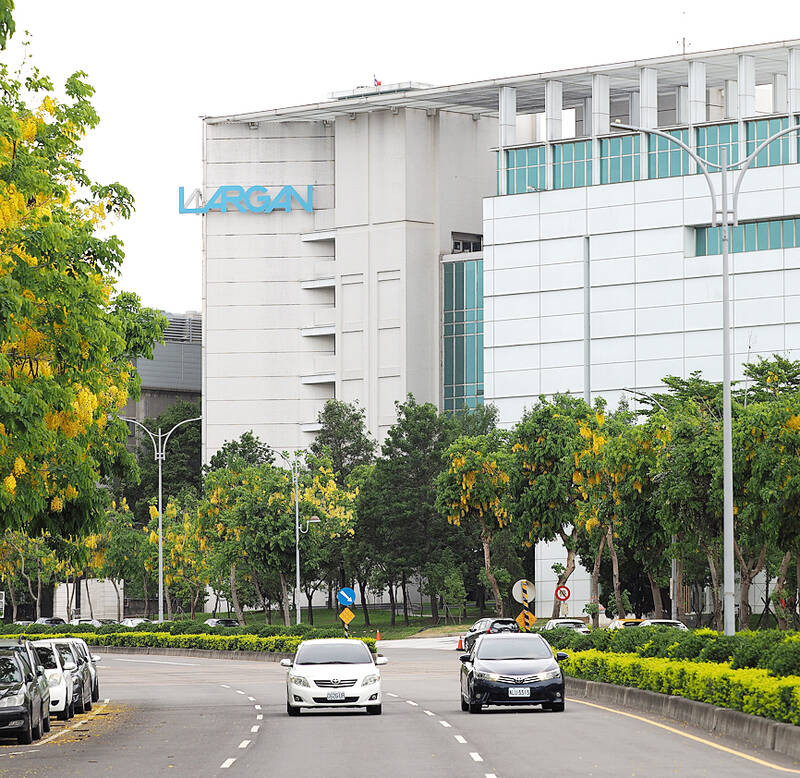Largan Precision Co (大立光), a camera lens supplier for Apple Inc’s iPhones, yesterday reported that its profit last quarter was the best in six quarters on the back of significant foreign exchange gains.
However, the Taichung-based company gave a lukewarm outlook for its first-half results, saying that smartphone vendors are slow to upgrade phone camera lenses.
Most smartphone vendors have opted for hybrid or tetraprism compact lenses for their flagship models, Largan said.

Photo: David Chang, EPA-EFE
“Not many companies are upgrading their phone specifications,” Largan chief executive officer Adam Lin (林恩平) told an online investors’ conference. “Few new phones are to hit the market in the second quarter ... although some customers are considering high-end camera lenses for mid-range phones.”
As demand is expected to stagnate, this month and next month should be “little changed” from last month, Lin said.
There was little visibility for June, he said.
Net profit last quarter soared 86 percent to NT$6.11 billion (US$189.69 million) from NT$3.29 billion a year earlier, the firm said.
On a quarterly basis, net profit expanded 23 percent from NT$4.96 billion, it said.
Earnings per share rose to NT$45.79 from NT$24.64 a year earlier and NT$37.20 a quarter earlier, it said.
Non-operating profit last quarter skyrocketed to NT$3.47 billion, with most of it from foreign exchange gains of NT$2.34 billion, compared with non-operating profit of NT$470 million a year earlier, it said.
Largan reported non-operating losses of NT$1.78 billion in the previous quarter.
Gross margin dipped to 49.2 percent last quarter due to a smaller revenue scale after a brief return to above 50 percent in the fourth quarter last year at 52.88 percent.
Last year, gross margin fell below 50 percent in the first three quarters.
Revenue last quarter grew 24 percent year-on-year to NT$11.31 billion, although it fell 37 percent sequentially.
Asked about the company’s outlook for gross margin, Lin said that “price is the most important factor, followed by utilization and yield rate.”
Gross margin for its tetraprism compact camera module, a costly camera lens adopted by premium iPhones and flagship models from other brands, should improve this quarter thanks to a better yield, he said.
Largan expects factory utilization to reach 100 percent by the end of this year, as its lenses are getting bigger, Lin said.
Largan is adding equipment as the manufacturing technology gets more complicated, he said.
The company is considering adding new capacity next year, depending on customer demand, he added.

DIVIDED VIEWS: Although the Fed agreed on holding rates steady, some officials see no rate cuts for this year, while 10 policymakers foresee two or more cuts There are a lot of unknowns about the outlook for the economy and interest rates, but US Federal Reserve Chair Jerome Powell signaled at least one thing seems certain: Higher prices are coming. Fed policymakers voted unanimously to hold interest rates steady at a range of 4.25 percent to 4.50 percent for a fourth straight meeting on Wednesday, as they await clarity on whether tariffs would leave a one-time or more lasting mark on inflation. Powell said it is still unclear how much of the bill would fall on the shoulders of consumers, but he expects to learn more about tariffs

Meta Platforms Inc offered US$100 million bonuses to OpenAI employees in an unsuccessful bid to poach the ChatGPT maker’s talent and strengthen its own generative artificial intelligence (AI) teams, OpenAI CEO Sam Altman has said. Facebook’s parent company — a competitor of OpenAI — also offered “giant” annual salaries exceeding US$100 million to OpenAI staffers, Altman said in an interview on the Uncapped with Jack Altman podcast released on Tuesday. “It is crazy,” Sam Altman told his brother Jack in the interview. “I’m really happy that at least so far none of our best people have decided to take them

PLANS: MSI is also planning to upgrade its service center in the Netherlands Micro-Star International Co (MSI, 微星) yesterday said it plans to set up a server assembly line at its Poland service center this year at the earliest. The computer and peripherals manufacturer expects that the new server assembly line would shorten transportation times in shipments to European countries, a company spokesperson told the Taipei Times by telephone. MSI manufactures motherboards, graphics cards, notebook computers, servers, optical storage devices and communication devices. The company operates plants in Taiwan and China, and runs a global network of service centers. The company is also considering upgrading its service center in the Netherlands into a

NOT JUSTIFIED: The bank’s governor said there would only be a rate cut if inflation falls below 1.5% and economic conditions deteriorate, which have not been detected The central bank yesterday kept its key interest rates unchanged for a fifth consecutive quarter, aligning with market expectations, while slightly lowering its inflation outlook amid signs of cooling price pressures. The move came after the US Federal Reserve held rates steady overnight, despite pressure from US President Donald Trump to cut borrowing costs. Central bank board members unanimously voted to maintain the discount rate at 2 percent, the secured loan rate at 2.375 percent and the overnight lending rate at 4.25 percent. “We consider the policy decision appropriate, although it suggests tightening leaning after factoring in slackening inflation and stable GDP growth,”